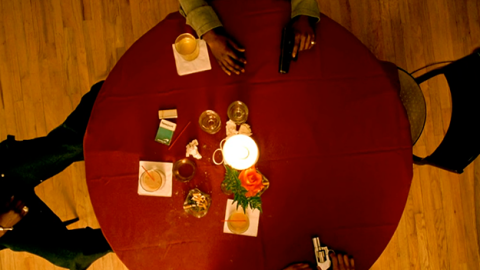By Farihah Zaman and Nicolas Rapold in the September-October 2016 Issue
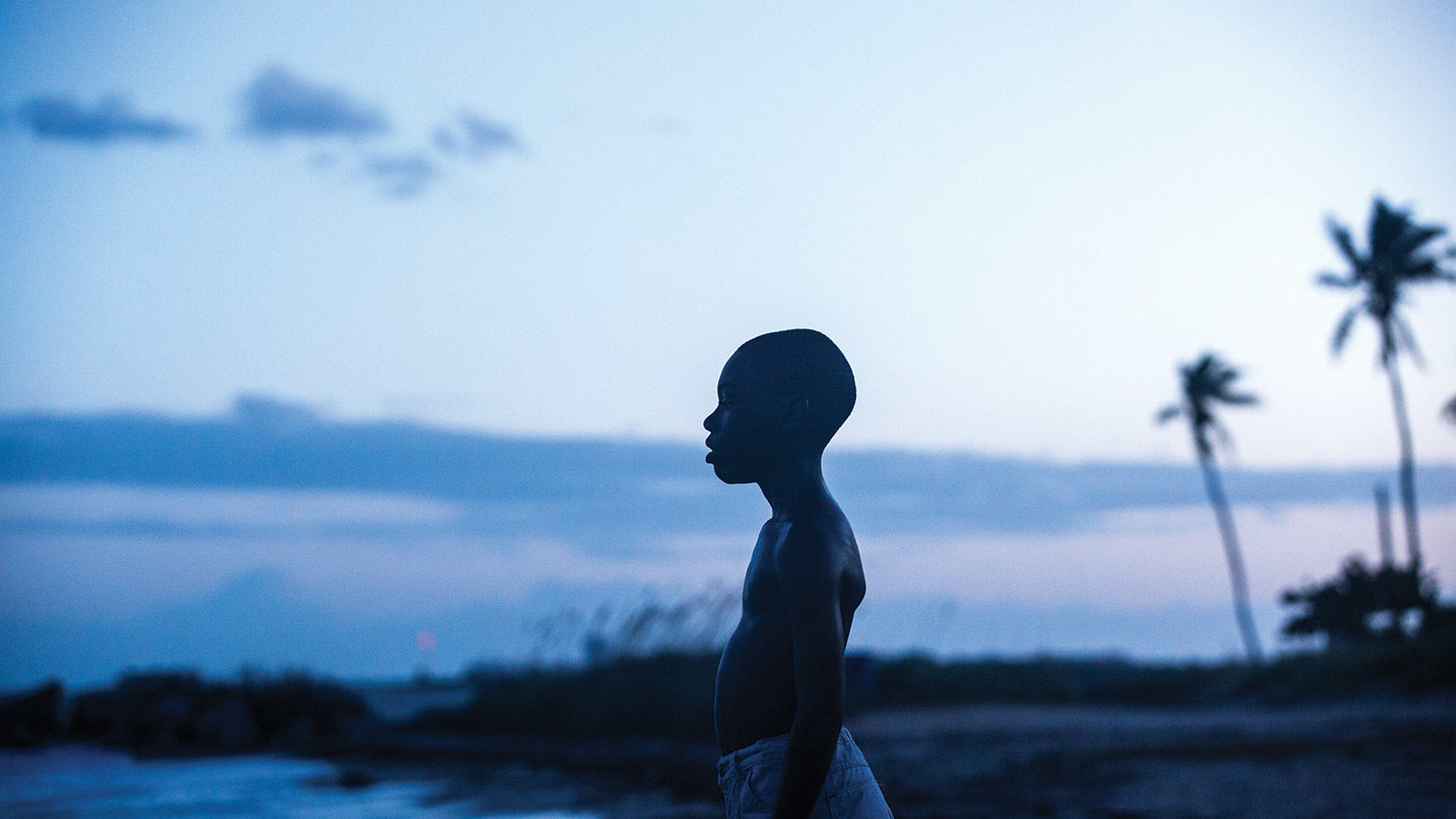
Song of Myself
Barry Jenkins confirms his talent with a heartwrenching and gorgeous portrait of a man grappling with his sexuality in a rough corner of Miami
The half-lovely, half-dangerous energy of two little boys running in the sunlight, moving together instinctively like a flock of birds. The exhilaration of learning to float in the ocean, gently released from loving grownup arms. The first touches of desire in the safe, warm dark with a friend one fervently hopes will become more than a friend. Moonlight, the remarkable new film by Barry Jenkins, who directed the gentle romantic drama Medicine for Melancholy (2008), revels in the elevation of everyday experience, transforming time’s passing into a series of rites of passage, the commonplace into the iconic. These are the kinds of moments and images that critics love to champion as “universal,” but in practice this particular universe tends to belong on screen to the white, straight middle class. With self-assured elegance, Moonlight takes back these shared points of human experience so that they might also reside in black communities and be borne out by black bodies, in a time when such depictions are still rare in independent cinema. Moonlight isn’t just a very good film, though it is in fact that. It is a necessary film for this moment in time, when the extinguishing of black men of all backgrounds, out of fear, becomes more visible—and less acceptable—to the general public.
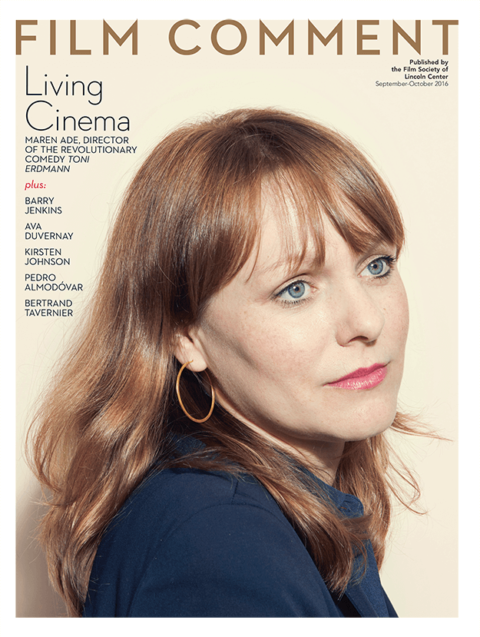
From the September-October 2016 Issue
Also in this issue
An adaptation of Tarell Alvin McCraney’s play In Moonlight Black Boys Look Blue, Moonlight follows the first three decades in the life of Chiron, who was born poor, black, and gay in 1980s Miami. The film is a triptych: Act I sees a near-mute elementary school child (Alex R. Hibbert) going by the unsolicited nickname Little; then we leap ahead to Chiron in high school (now played by Ashton Sanders), after he has taken back his given name but is still mercilessly picked on for being different; and then in Act III, going by the name Black, a hardened Chiron (Trevante Rhodes) runs a drug ring in Atlanta and masks his insecurities with unnerving shows of masculinity. That the protagonist chooses to change names in each phase of his life (with each segment named after Chiron’s given moniker) highlights the character’s evolution, and the transformative effect of seemingly small events over time. Well into adulthood Chiron is still essentially shape-shifting in reaction to the existential struggles planted in childhood: his complex relationship with a protective but drug-addicted mother, his desire for love and acceptance, and his burgeoning awareness of his sexuality.
Jenkins imbues Chiron with a palpable queerness in every sense, which is always clear if not identifiable to himself, those around him, and the movie’s audience. Being gay in this time and place, even without being openly so, feels life-threatening, and Chiron’s mother (Naomie Harris), with a realistically complicated mixture of concern, love, and ruthlessness, tries to correct any homosexual “tells” in her son’s speech and mannerisms and comments disdainfully on his swishy walk. Chiron’s classmates, with herd mentality instinct and cruelty, ostracize him verbally and physically, which escalates as he enters high school. Jenkins depicts the sense of being sniffed out and hunted—for being too queer, too gentle, too awkward, too anything—with extraordinary insight.
Chiron’s feelings of isolation are so effectively communicated in part because the film fully submerges us in his perspective. This is brought to life by the film’s stylized cinematography (by James Laxton) and sound design. The camera frequently lingers on Chiron’s face, particularly at the beginning of each act. When we first meet Chiron, he is pursued into an abandoned house by a gang of kids, and as they pound on the doors and windows the house seems to shake as in an earthquake, as though fear is ringing and echoing inside his head. Later, when teenaged Chiron experiences his first and only moment of sexual pleasure with his friend Kevin on an empty beach, the rush of the ocean swells, the world blurs, eyes close, not out of some forced sense of drama but because that is how it feels. The significance of utilizing this style with these characters, to engage more deeply with the humanity, sensitivity, and consciousness of a queer, black, male adolescent cannot be overstated; it is practically an act of protest.
Even in basic plotting Moonlight avoids clichés of poor black narratives—for example, in the way drug dealer Juan (Mahershala Ali), who becomes a father figure to Chiron, is also the first to express an unconditional understanding of his sexuality. But it is the courage of its artistry that makes the film exceptional. The soundtrack alone exemplifies a general rebellion against expectations, as Jenkins refuses to subscribe to the rule that when telling tales from the hood, you play the music that your characters would listen to themselves. While there is a good amount of diegetic rap and hip-hop (Chiron listening to Jidenna’s “Classic Man” as he drives up to Kevin’s restaurant is a flawless choice), there’s also an elegiac classical-sounding original score (by Nicholas Britell) in moments of calm and reflection, the hauntingly wistful guitar strumming of the tragic Spanish love song “Cucurrucucú Paloma” beckoning Chiron over the bridge back to Miami to see Kevin after years without any contact, and the purring 1960s Barbara Lewis classic “Hello Stranger”on the jukebox when they’re reunited.
That the kind of aestheticization offered by the film is so rarely used for stories of the experience of being black in America demonstrates that too often cinematic naturalism is conflated with authenticity. Yet Moonlight makes us feel for Chiron and understand him better because the hand of the filmmaker is evident, because of the choices made to enhance that cinematic moment in its entirety rather than cling slavishly to documentary-style realism. This is Jenkins’s triumph: he neither evades the sometimes difficult realities of poor black communities nor does he bind his characters reductively to them. Moonlight reminds us that, as people of color, we so rarely get to have these stories too—tales of epic romances, traumatic hurts, minor blessings. Yet while Chiron’s identity is integral the story, the film’s most meaningful moments occur when cultural assignations like “black” or “gay” or “poor” drift away in the tide of human feeling, flirtation, longing, love, desire.—Farihah Zaman
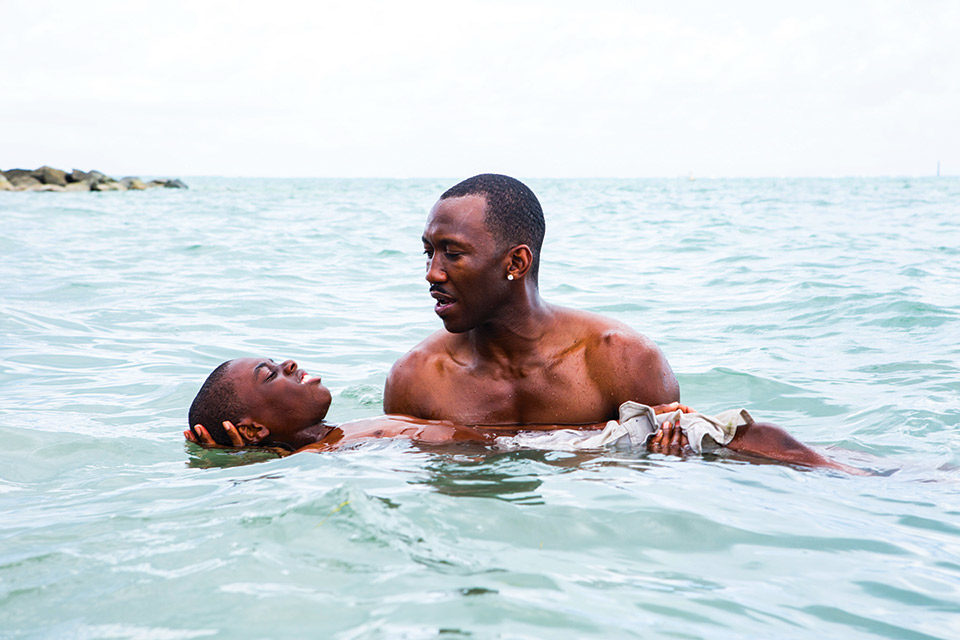
INTERVIEW WITH BARRY JENKINS
By Nicolas Rapold
The film tracks three ages in the life of Chiron: as a boy, a teenager, and an adult. It’s almost like a piece of music with movements.
You have this character who is sort of receding inside himself. And the music within the film tells us what he can’t. In the beginning it starts out very, very small. Once you get to that third story, the music [the actual soundtrack] starts to get a lot more expressive and sensual.
Is some of the music slowed down?
It’s this Southern form of hip-hop called “chopped and screwed,” where the voice is really deep and it’s really slowed down and lines are repeating. I grew up listening to it; it started in Houston and Tampa . . . but Houston claims it. It makes hip-hop almost hypermasculine, but it opens up all this yearning in the lyrics. Hip-hop is usually moving at such a high bpm that you don’t catch that not only is this poetry, but it’s really pained. If you chop and screw it, you allow all of that pain to come through. I worked closely with the composer, Nick Britell. We also have a lot of violin, cello, and oboe. It’s almost like taking someone’s heartbeat and slowing it down. Putting it on full display. Which I think is sort of what the actors did with the characters.
Since we’re on the music, what’s the opening track?
Kendrick Lamar’s last album, To Pimp a Butterfly, opens with this track. We actually use another version that’s slightly chopped and screwed. The song is “Every Nigger Is a Star” from a blaxploitation film by Boris Gardiner. You know, Moonlight is an “art-house” film and all that other shit, but it’s also a film that’s just about home. And at home I’d be a guy like Chiron, driving around, blasting that song out of his car. The movie’s really personal, it’s about exactly where I grew up. And in the place that I grew up, there’s a lot of pride about being where you’re from.
Could you talk about working with the actors? Ashton Sanders as teenage Chiron has this inward, pained intensity. Trevante Rhodes as the adult plays a big guy that still has the little guy in him.
Exactly. And they never rehearsed together, they never saw any dailies from the other actors. I wasn’t worried about whether they all looked or sounded the same. What I was concerned about was, when the camera’s on them and they’re not speaking, how’s this person going to emote? Are they going to try to externalize their emotions, or are we going to just feel the pain beneath the surface? The iceberg theory. They’re all iceberg actors, man. Ashton would explain what his approach to the character was, from moment to moment. It’s a very intellectual approach to the performance, but then what you see on screen is very raw. It’s just a guy who’s wearing his emotions on his face, and he’s attempting to hide them all.
What about the film has a sense of home for you?
I grew up a block away from the apartment in the film. And then some of the voices, and the way people’s skin is always shiny—we told the makeup guy: no powder, we need sheen. But the main thing is the mom character, played by Naomie Harris. The playwright Tarell McCraney wrote the source material, like 40-45 pages, non-linear. It jumped back and forth in time, like halfway between the screen and the stage. And when I read it I immediately thought: this is a film. I did not know Tarell growing up, but we grew up literally a block from each other. We went to the same elementary school, and both his mom and my mom lived through that horrible crack-cocaine addiction. And there isn’t a scene with her that didn’t happen to either myself or Tarell. It’s talking about things that I’ve always wanted to talk about. And it was freeing because it’s really difficult to do autobiography, to put your own shit up on screen.
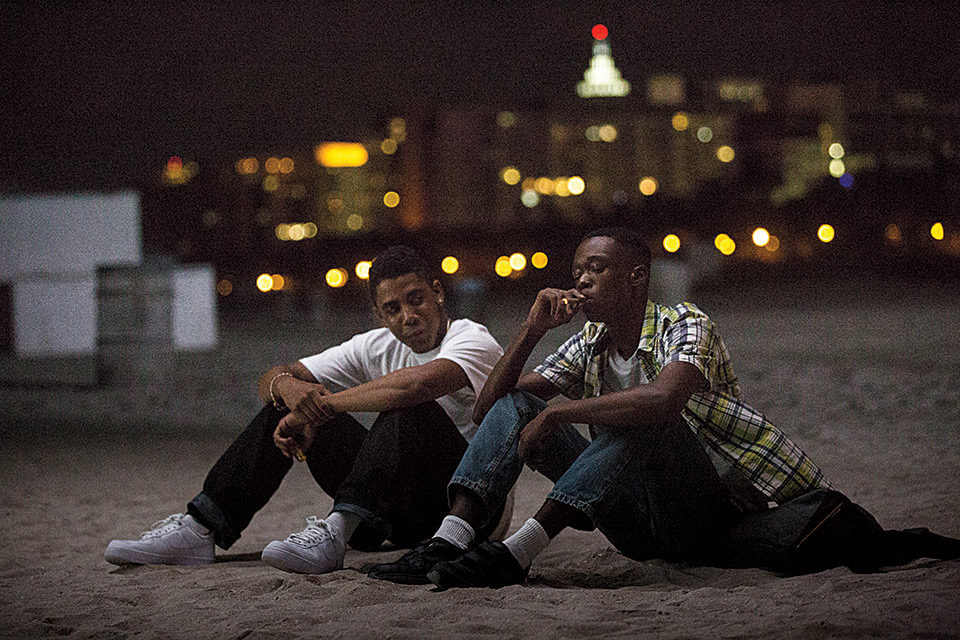
You give such an immersive sense of Miami as a space. And there are a couple of very potent portrait-like shots of characters.
We wanted to find a few little moments to use the idea of the actors looking right at the camera. And that goes back to theater. I didn’t want to have all this ugly imagery and very dark things from my past, and allow the audience to stay completely outside it. And I also thought it was very important to have the audience look right into the eyes of a man who is very sensually thinking of another man. In regards to Miami and shooting digital, I think the Alexa actually has a really lush image. James [Laxton, the DP] and I are weird filmmakers: we’re just old enough to have been in film school when you shot everything on film. So we learned shooting on Arri cameras, actually. The Arri SR2, shooting Super 16.
With the visual style, I feel like I got the opportunity to take my memory and put it on screen: in Miami, you’re often adrift, you’re just walking through these massive spaces. As a kid this sort of environment was normalized. It was like, “Fuck, okay, this is a rough neighborhood and we’re really poor, and there’s nothing to eat on Fridays, but shit, there’s this huge field I’ve got. I’m going to go out and run and play, you know?” There’s so much greenery and open sky, so we wanted to reflect that with the actual 2.35:1 frame to portray how I felt. The previous film I made, Medicine for Melancholy, is very low-budget and pretty saturated. In this film, we wanted these very neorealistic visuals, set in this place that I remember being super vibrant, super bright, and super colorful. And just full of space.
Could you discuss the use of silence and this sense of presence?
The way I grew up, I was kind of a quiet kid. I ended up watching people a lot, more than interacting, in a certain way. And I think you can learn a lot more about people when they’re not speaking than you can when they’re speaking. People say, “Oh, you can learn more by actions than statements.” But I do think that when people are in repose, you really see beneath the surface.
Were any movies in your head while planning and making Moonlight?
Three Times by Hou Hsiao-hsien. That had a three-romance structure—a triptych. There is an homage to Three Times, the first story in the pool hall. When Chiron first walks into the diner, we’re on the dolly, and then he sits at the counter, the camera pans, and we find André; André walks in the back of the kitchen, camera pans back, André comes down the little alley, and then we do the portraits. Because in the first story, Hou Hsiao-hsien is in the pool hall; camera’s perpendicular to the scene, just dollying back and forth, and just panning.
This is like a coming-of-age story, but it’s got to have one huge arc with all these peaks and valleys. It’s Eisenstein—the relation’s in the cuts. There is as much story between the stories, as there is in the three stories. And those three stories, they’re just brief moments. Very important, crucial moments. But because of that, we can allow a moment that’s like five minutes in a coming-of-age story, and now we can do it in 30. We can allow the space. We can see people thawing, see things seeping beneath the skin.
Closer Look: Moonlight screens in the New York Film Festival and opens on October 21.
Farihah Zaman is a Brooklyn-based filmmaker (Remote Area Medical, This Time Next Year) and writer, and currently works as the Production Manager for the visual journalism unit Field of Vision.



